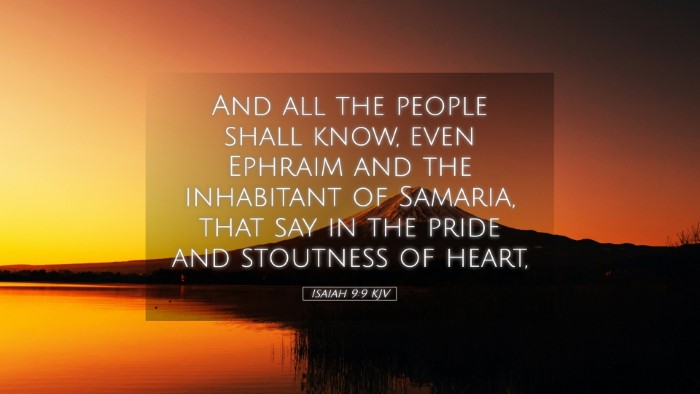Commentary on Isaiah 9:9
Isaiah 9:9 states: "And all the people shall know, even Ephraim and the inhabitants of Samaria, that say in the pride and stoutness of heart." This verse is a significant part of the prophetic literature in Isaiah, reflecting both the sociopolitical reality of Israel at the time and the underlying theological themes that resonate throughout the Scriptures.
Introduction
This commentary draws upon the classical insights from Matthew Henry, Albert Barnes, and Adam Clarke, providing a combined overview suitable for pastors, students, theologians, and scholars. The passage emphasizes the pride of the people of Israel, particularly the Northern Kingdom (Ephraim). Understanding this verse is crucial to grasping the broader message of Isaiah regarding sin, judgment, and hope.
The Context of Isaiah
The Book of Isaiah is set in a time where Israel faced internal decay and external threats. While the original audience was subjected to the Assyrian empire's dominance, Isaiah's prophecies revealed God's sovereign plan and hope for restoration.
Historical Background
During Isaiah's time, particularly in the reign of Ahaz, the people of Israel were marked by arrogance and unfaithfulness. As Barnes explains, this pride manifested in their reliance on their own military strength and their desire to form alliances rather than trusting in God.
The Significance of Ephraim
Ephraim, representing the Northern Kingdom, is highlighted due to its prominent role in Israel's history. Clarke notes that the name "Ephraim" is often used metaphorically to refer to the entire nation. Therefore, God's message through Isaiah serves as a direct warning to the entire populace, exposing their spiritual decay.
Pride and Stoutness of Heart
The verse signifies a spiritual sickness characterized by pride. Matthew Henry elucidates that such pride stems from a lack of humility before God. The "stoutness of heart" implies an obstinacy that prevents the people from recognizing their dependence on divine mercy. It is a staggering moment of self-deception that invites divine judgment.
Theological Implications
Isaiah’s message holds immense theological weight. It challenges the preconceptions about the chosen people, known for their covenant relationship with God yet severely flawed in their conduct. Albert Barnes highlights that these characteristics of Ephraim serve both as a historical account and a timeless warning against complacency and spiritual pride in any age.
Divine Judgment vs. Divine Hope
While the prophecy displays impending judgment due to pride, it also holds a thread of hope that runs throughout the book of Isaiah. Clarke posits that this duality showcases not only God’s justice but also His mercy. Understanding the context helps the reader discern that God's desire is not judgment for its own sake, but rather restoration of His wayward people.
The Consequences of Pride
as Henry emphasizes, pride often leads to downfall. It is through acknowledgment of sin and reliance on God's grace that restoration can be achieved. The residents of Samaria and Ephraim’s denial of their shortcomings signifies a larger spiritual crisis that can apply to contemporary readers who may similarly stray into self-sufficiency.
Application for Today
For pastors and theologians, Isaiah 9:9 offers pertinent insights into preaching about sin and the need for humility. The pride of Ephraim serves as a reminder that societal structures and structures of power may lead to arrogance before God. Clarke’s examination encourages believers to reflect upon their own hearts and confront pride in their spiritual walk.
Learning from the Past
As Barnes notes, understanding these biblical occurrences and the responses of God’s people helps current generations avoid repeating similar mistakes. The call for humility resonates deeply even in modern contexts filled with distractions and false securities.
Conclusion
In conclusion, Isaiah 9:9 encapsulates a critical moment in biblical history where pride leads to spiritual blindness. As we reflect on this verse, we are invited to reassess our own spiritual lives and acknowledge the areas where we may be resistant to God's leading. Through the lens of historical and theological insights from Henry, Barnes, and Clarke, the ongoing message remains clear: true knowledge of God fosters humility, encourages trust, and ultimately leads to restoration in the face of human frailty.
Further Reflections
- Humility as a Requisite for Restoration: The need for humility before God cannot be overstated; it is the precursor to genuine repentance.
- Understanding Pride: Reflecting on pride in our lives will help in confronting areas where we may resist divine correction.
- Seeking Community: Just as Isaiah’s message was to a community, so should our spiritual journeys be in fellowship with other believers.


